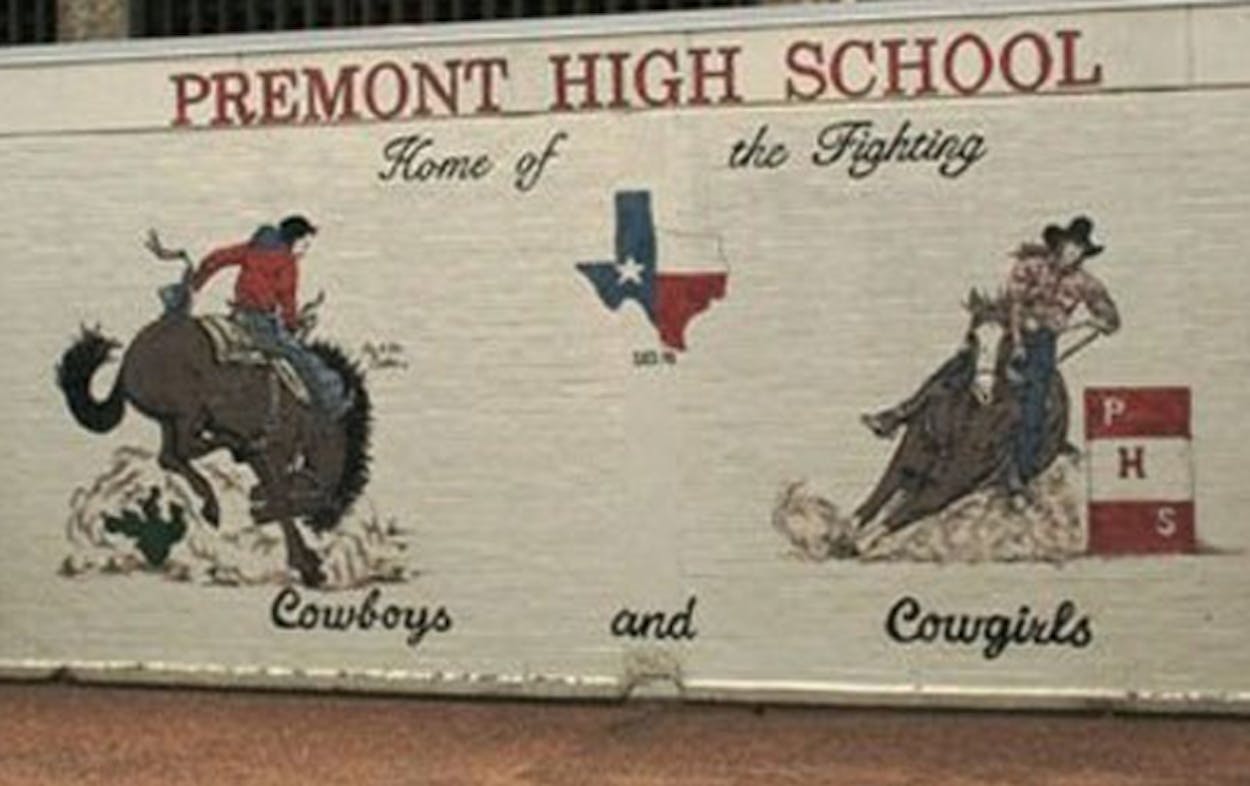The Premont High School boy’s basketball team beat Hebbronville on Tuesday, 44-39. Gus Garcia paced the Cowboys with seventeen points, while Eloy Martinez hauled in fourteen rebounds. But the game itself is not the reason why the Texas Tribune‘s Morgan Smith attended for a story that also appears in Friday’s New York Times “Texas Report” (Full disclosure: TEXAS MONTHLY provides cultural coverage for the New York Times’ “Texas Report,” which is produced by the Texas Tribune.)
Premont, a South Texas ranching town of less than 2,700 people that is located between Kingsville and Falfurrias, has made national headlines because its school district decided to suspend sports for a year. As Rhiannon Meyers of the Corpus Christi Caller-Times first reported, that means there will be no tennis, track, or baseball in the coming spring, and no volleyball or football in the fall.
The decision dates back to last summer when the Texas Education Association planned to completely shut down the district, which has been saddled with a lethal combination of declining enrollment, debt, inadequate facilities, and poor attendance. If the shutdown happens—and it still could—Premont’s students would become part of the school district in San Diego, which is 35 miles away.
“The school shuts down in this town, the town dies,” Jim Wells County constable Frank Davila told Christopher Sherman of the Associated Press. “This is all we have.”
The school is Premont’s largest employer, so, as the Caller-Times‘s Meyers also reported, earlier this month the school made a deal with the state to remain open one more year while it attempted to reach eleven TEA-mandated goals.
According to Meyers, Premont superintendent Ernest Singleton’s decision to suspend athletics for the spring immediately frees up $50,000 that will go toward the state requiement to open “two fully functional science labs” by August 1. There will be additional savings by not having football. Writes the Tribune‘s Smith:
It was a daring, and rare, move in a state where the football field is hallowed turf. But at a Tuesday night high school basketball game, Premont residents appeared largely in favor of the suspension.
Students worried about their friends who talked about transferring to high school at “Fal” — in the town of Falfurrias ten minutes south— so they could participate in athletics. But they acknowledged that it would be worth it to save the school district.
Steven Pena, 15, said he was “crushed” at the announcement. Playing sports year-round, he said, helped him stay out of trouble. But without games and practices to occupy his time, he said he may study more.
“This is the time to make the sacrifice,” said Joann Moreno, sitting next to her husband, whom she met when they were both students in Premont, as they watched their son on the court….
If the decision has come with little backlash from within the community, it could be a measure of how well it understands Premont ISD’s dire financial predicament.
(Perhaps even more shocking than giving up football, the town has passed a tax increase.)
“This is an incredibly hard situation,” Premont’s football, boys basketball and track coach Richard Russell told Mac Engel of the Fort Worth Star-Telegram. “It’s sad because the ones affected by this are the kids. They are having to pay for the mistakes that were made in the past. It’s a sad situation for everybody — the kids, the teachers, the coaches, the community, the school.”
Ann Zimmerman of the Wall Street Journal also wrote about Premont’s decision. She talked to Kyle Ward of the Texas PTA, who did not seem in favor of the move. “The PTA really believes education should address the whole child, both academically and physically,” Ward said. “Besides physical fitness, school sports offers character building and role models that children need.”
But as a January 10 Caller-Times editorial suggested, the district’s battle to stay open may well give the town and its young people the same sort of life lessons sports are meant to:
They will have good reason to believe when their parents, teachers and coaches tell them: “if at first you don’t succeed, try, try again,” “nothing ventured, nothing gained” and “the only real failure in life is the failure to try.” That would be success enough.







